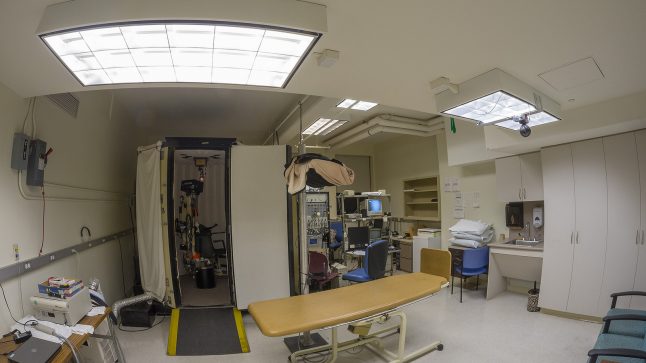The Human Balance Laboratory at Icahn School of Medicine at Mount Sinai, New York, was originally established by the late Mingjia Dai, PhD, in 1992 and is now directed by Sergei Yakushin, PhD. The lab was funded by NIH and NASA on the studies in motion sickness and mal de debarquement syndrome (MdDS)..
Mal de Debarquement Syndrome (MdDS) is an under-recognized but nevertheless common balance disorder, which in most cases occurs after exposure to prolonged passive motion. MdDS is manifested by constant postural rocking/swaying or the gravitational pull of the body and is accompanied by high sensitivity to light, noise, or crowds, or cognitive dysfunctions, including short-term memory impairment. In addition to motion-triggered (MT) cases of MdDS, similar symptoms can occur without a clear trigger, identified as spontaneous MdDS. We recently developed the first effective treatment method for MdDS based on readaptation of the vestibulo-ocular reflex (VOR). Over the past several years, more than 600 patients from around the world have been treated with this method. The hypothesis underlying this treatment is that MdDS is caused by maladaptation of a functional component of the VOR called velocity storage, whose readaptation can be stimulated by exposure to whole-field visual motion coupled with head tilts. Our current success rate immediately after treatment of MT MdDS is 75%. However, some patients report the return of symptoms after flights or prolonged car rides following a treatment. Thus, for some patients, the effectiveness of the current MdDS treatment protocol appears to depend on a serious practical limitation of needing to avoid transportation permanently. Building on the previous hypothesis of velocity storage maladaptation, we currently hypothesize that reduction (habituation) of velocity storage can also resolve MdDS symptoms. Velocity storage can be significantly habituated by 4-5 days of treatment with a protocol previously designed in our laboratory to reduce susceptibility to motion sickness. Preliminary data support that velocity storage habituation reduces MdDS symptoms.
In this project, 30 motion-triggered MdDS patients with no history of inner ear problems and no severe neurological decoders will be randomly assigned into two groups. Group 1 will be treated with the habituation protocol only, and Group 2 will be treated with the VOR readaptation protocol only. Patients will be followed up for up to 6 months.
Based on the preliminary data, we expect both groups to experience similar initial symptom improvement, but Group 1, undergoing the habituation protocol, to better retain the initial treatment impact. This project will broaden treatment options for MdDS and increase the current understanding of recurrent MdDS.
If you would like to participate in this study, please contact Dr. Sergei Yakushin, PhD by email at sergei.yakushin@mssm.edu
Press Releases:
- https://www.mountsinai.org/about/newsroom/2014/new-treatment-successful-for-rare-and-disabling-movement-disorder-the-mal-de-debarquement-syndrome-mdds
- Media:
- https://www.youtube.com/watch?v=ygB3CgxM0us
- https://clinicaltrials.gov/ct2/show/NCT04213079
- http://mdds.nyc/vestibular-treatment-center-personnel/
- https://vestibular.org/spotlight/william-johnson/
- https://dizziness-and-balance.com/treatment/rehab/mdd/roll_adaptation.html
- https://nautil.us/blog/-what-to-do-when-your-brain-insists-youre-always-on-a-boat
- https://www.barany2022.com/pl05.php
- https://www.youtube.com/watch?v=g4oyDOHEBDI

